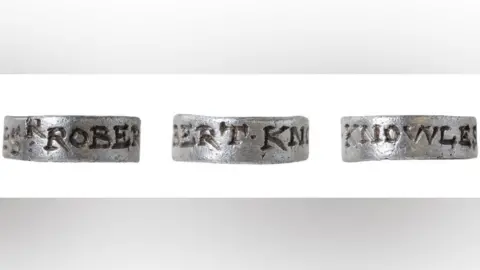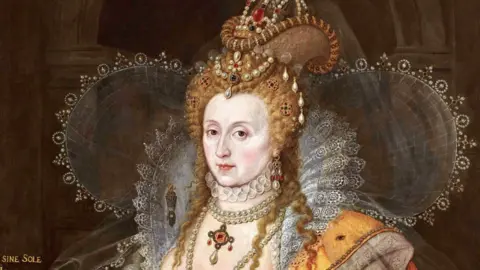Hawk tag discovery linked to Elizabeth I's cousin
 Andrew Williams/Norfolk County Council
Andrew Williams/Norfolk County CouncilThe discovery of a silver hawk tag has uncovered the story of one of Elizabeth I's cousins, who also had family links to two of her favourites.
The identity tag, known as a vervel, was found by a metal detectorist near Thetford, Norfolk, in early 2024, and has been declared treasure by a coroner.
It belonged to the well-connected landowner and MP Sir Robert Knollys, a grandson of the queen's aunt Mary Boleyn.
Parliamentary records revealed Sir Robert was very interested in hunting and hawking, said Norfolk's finds liaison officer Helen Geake.
"He sat on numerous parliamentary committees to do with hawking and hunting and what's more unusual is he was also appointed to a committee on hunting with guns, which was a very new thing then."
 Nicole Ryder
Nicole RyderHunting with hawks was a hugely popular sport for the wealthy, from the Middle Ages until the mid-17th Century.
Vervels were used to identify ownership of the birds if they were found dead or had flown off.
The 6.1mm diameter (0.36in) silver find was engraved SR. ROBERT. KNOWLES.
'Regular updates'
Dr Geake's research revealed it belonged to Robert Knollys, who was born in about 1547 in Rotherfield Greys, Oxfordshire, and died in 1618.
Sir Robert had a Norfolk connection through marrying one of his daughters to the politician Framlingham Gaudy, from West Harling, a few miles from Thetford.
"We know he kept hawks on his son-in-law's estate and received regular updates about them from his servants," said Dr Geake, from Norfolk County Council's Environment Service.
Sir Robert's father was the long-serving treasurer of Elizabeth I's household and his sister Lettice secretly married Robert Dudley, Earl of Leicester in 1578.
The earl had long been the queen's favourite, and even hoped to marry her at one point, but his marriage resulted in Lettice's banishment from court until Elizabeth died in 1603.
Sir Robert's nephew Robert Devereux, Earl of Essex, became another of the queen's favourites until an attempted uprising in 1601 resulted in his execution.
The massive increase in firearms during the English Civil Wars (1642 to 1651) helped bring about the end of hawking, because it was much easier to shoot game for the kitchen than train a hawk for the purpose.
A coroner at a treasure inquest typically decides whether the discovery is treasure, and therefore whether a museum should have first refusal over it.
Norwich Castle Museum hopes to acquire it.
Follow Norfolk news on BBC Sounds, Facebook, Instagram and X.
